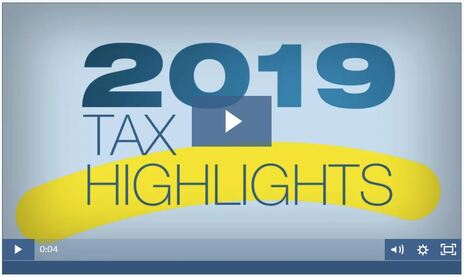|
If you could not complete your 2018 tax return by the normal April filing due date and are now on extension, that extension expires on October 15, 2019. Failure to file before the extension period runs out can subject you to late-filing penalties.
There are no additional extensions (except in designated disaster areas), so if you still do not or will not have all of the information needed to complete your return by the extended due date, please call this office so that we can explore your options for meeting your October 15 filing deadline. If you are waiting for a K-1 from a partnership, S-corporation, or fiduciary return, the extended deadline for those returns is September 16 (September 30 for fiduciary returns). So, you should probably make inquiries if you have not received that information yet. Late-filed individual federal returns are subject to a penalty of 5% of the tax due for each month, or part of a month, for which a return is not filed, up to a maximum of 25% of the tax due. If you are required to file a state return and do not do so, the state will also charge a late-file penalty. The filing extension deadline for individual returns is also October 15 for most states. In addition, interest continues to accrue on any balance due, currently at the rate of 5% per year. This rate is subject to adjustment quarterly. If this office is waiting for some missing information to complete your return, we will need that information at least a week before the October 15 due date. Please call this office immediately if you anticipate complications related to providing the needed information, so that a course of action may be determined to avoid the potential penalties. Additional October 15, 2019 Deadlines – In addition to being the final deadline to timely file 2018 individual returns on extension, October 15 is also the deadline for the following actions:
If you need assistance, please contact us or schedule a consultation to review extended due dates of other types of filings and payments and for extended filing dates in disaster areas.
The information presented is of a general nature and should not be acted upon without further details and/or professional guidance. For assistance in identifying and utilizing all the tax deductions to which you are entitled, please contact us, your CPA or tax preparer.
There are more changes in tax credits and deductions for 2019. How will you be affected? Are you prepared? Check out this video to learn more and to avoid taking a big tax hit.
If you have questions on estimating where you stand, please schedule a complimentary consultation to review your tax status and planning needs.
The information presented is of a general nature and should not be acted upon without further details and/or professional guidance. For assistance in identifying and utilizing all the tax deductions to which you are entitled, please contact us, your CPA or tax preparer.
The information presented is of a general nature and should not be acted upon without further details and/or professional guidance. For assistance in identifying and utilizing all the tax deductions to which you are entitled, please contact us, your CPA or tax preparer.
This is general information and should not be acted upon without first determining its application to your specific situation. Please contact us, your CPA or tax adviser for additional details.
For help managing the reporting for and documenting of independent contractors or to select a payroll service for individuals who should be categorized as employees, please schedule a complimentary consultation to review your needs. We'd be happy to help!
This is general information and should not be acted upon without first determining its application to your specific situation. Please contact us, your CPA or tax adviser for additional details.
QuickBooks and Other Discounts Available
Why pay more for software and services than necessary? Check out our Resources page for information on discounts available to our clients.
Here are a couple of mission statement examples from large companies who have maintained a successful foothold in the marketplace:
Harley-Davidson: We fulfill dreams through the experience of motorcycling, by providing to motorcyclists and to the general public an expanding line of motorcycles and branded products and services in selected market segments. Darden Restaurants: To nourish and delight everyone we serve. FedEx: FedEx will produce superior financial returns for shareowners by providing high value-added supply chain, transportation, business and related information services through focused operating companies. Customer requirements will be met in the highest quality manner appropriate to each market segment served. FedEx will strive to develop mutually rewarding relationships with its employees, partners and suppliers. Safety will be the first consideration in all operations. Corporate activities will be conducted to the highest ethical and professional standards. Ford: We are a global family with a proud heritage passionately committed to providing personal mobility for people around the world. Levi-Strauss: People love our clothes and trust our company. We will market the most appealing and widely worn casual clothing in the world. We will clothe the world. Microsoft: At Microsoft, we work to help people and businesses throughout the world realize their full potential. This is our mission. Everything we do reflects this mission and the values that make it possible. NIKE: To bring inspiration and innovation to every athlete in the world. The Walt Disney Company: The mission of The Walt Disney Company is to be one of the world's leading producers and providers of entertainment and information. Using our portfolio of brands to differentiate our content, services and consumer products, we seek to develop the most creative, innovative and profitable entertainment experiences and related products in the world. Mission Statement or Vision Statement? A mission statement differs from a vision statement because a vision statement communicates what the company wants to be. Ask yourself what your business’s core purpose is. What is the impact you want to have on the world? Once you know, you’ll be able to write your own mission statement. Sharing Your Mission Statement There are many ways you can share you mission statement.
A mission statement is something to be proud of and something that should make people smile. Yours should motivate and energize you. Once you’ve written yours or if you already have one, be sure to share it with us.
Approximately 4,000 businesses were hit with very bad news this past week when the payroll company MyPayrollHR suddenly shut down. With it's closure, an estimated $35 million dollars of business and employee payroll funds were lost. If your company was impacted by this incident and you need assistance getting back on top of your payroll, please don't hesitate to give us a call or email us. We would be happy to work with you and our reputable payroll provider partners to get your payroll back up and running. (Check out our Resources page for additional details.)
Having enough cash is akin to having a safety net for your business. It can sometimes even mean the difference between staying in business and going out of business. To plan how much you might need for your safety net, you can use a few different methodologies.
One way to plan your safety net is to prepare for the worst-case scenario. How long would your cash hold out if no revenue were to come in but all expenses kept going out? Some questions you might ask:
Another way to plan your safety net is to do what the average business does: acquire the amount of cash you need for two to three months’ worth of operations and keep it on hand. Alternately, you can make a plan to liquidate that much cash on a very fast basis and only put your plan in place if it’s needed. An easy way to get these numbers is to utilize cash flow forecasting tools. A more manual way is to look at your bank statements in conjunction with your average accounts receivable and accounts payable balances. If that’s all Greek to you, no worries. Feel free to contact us and we can help you figure out a safety net number that you’ll feel comfortable with and that will keep your business risk low. Once you have a safety net in place, you’ll gain peace of mind for your business. It’s one step in an overall disaster preparedness plan that you can make for your business.
This is general information and should not be acted upon without first determining its application to your specific situation. Please contact us, your CPA or tax adviser for additional details.
QuickBooks and Other Discounts Available
Why pay more for software and services than necessary? Check out our Resources page for information on discounts available to our clients.
|
AuthorSuccessfully meeting the challenges inherent to new and smaller businesses provides me with a special type of satisfaction. Archives
February 2022
Categories
All
|










 RSS Feed
RSS Feed







